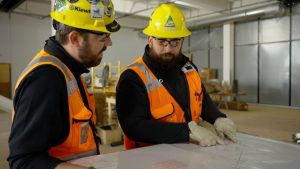
The construction industry is ripe with opportunities, particularly in management and leadership. These positions continue to evolve thanks to the increasing focus on sustainability, safety and technological advancements. In this article, we explore the different educational paths to a leadership role in construction and some of the different roles available in the industry.
Formal education can provide a structured foundation for forging a career in construction management. Some common academic routes to consider are:
1. Associate’s Degree in Construction Technology: This program covers construction methods, safety regulations and project documentation to prepare students for entry-level roles such as field engineer assistant or safety technician.
2. Bachelor’s Degree in Construction Management or Civil Engineering: This degree includes coursework in project planning, cost estimating, sustainable construction practices and more. Graduates often end up roles like project manager, construction manager or construction estimator.
3. Master’s Degree in Construction Management: This is a specialized program on risk management, sustainability and advanced project planning designed for professionals looking to move into senior leadership positions.
4. Industry certifications and credentials (CCM): CCMs demonstrate expertise in project management and enhance career prospects. Safety-focused ones such as the Occupational Safety and Health Administration (OSHA) 30-Hour Construction Training are highly valued in leadership roles.
The field of careers in construction management is vast, with roles spanning project oversight, budgeting and workforce management. Below are some of the most in-demand positions.
1. Project Manager
A construction project manager acts as a liaison between sponsors, clients and the construction manager, focusing on resource allocation and support to ensure the project is completed on time. They are responsible for overseeing the entire lifecycle of a construction project, from initiation to completion.
As construction projects grow in complexity, the demand for skilled project managers with expertise in digital tools such as Building Information Modeling and project management software is increasing. These tools help optimize workflows and improve project accuracy.
Other key skill sets include proficiency in project management software like Procore and Buildertrend, strong leadership and communication abilities. Knowledge of sustainable building practices is also becoming increasingly important as more projects move toward green construction.
2. Construction Manager
The construction manager is responsible for overseeing on-site activities, supervising workers and ensuring safety protocols are followed. They work closely with project managers to ensure smooth project execution. With a growing emphasis on sustainability and energy-efficient buildings, construction managers with expertise in green construction technologies or solar installation are in great demand.
Key skill sets include strong leadership and problem-solving skills, knowledge of safety protocols and expertise in sustainable building methods and technologies. Familiarity with advanced safety equipment—such as wearable sensors or drones—is also beneficial.
3. Construction Estimator
A construction estimator analyzes project costs, including materials, labor and equipment. In an era of rising material costs and global supply chain disruptions, people with knowledge of market trends and the ability to use advanced estimating software like Bluebeam or RSMeans have a competitive edge.
Estimators help firms remain cost-effective while ensuring quality and are expected to have a deep understanding of construction materials and methods. They need the ability to adapt to fluctuating market conditions and supply chain challenges, as well.
4. Safety Manager or Officer
Safety managers and officers oversee developing and enforcing workplace safety protocols to minimize risks and injuries. They conduct regular safety audits and ensure compliance with OSHA regulations. Strong communication skills are vital for these professionals to foster a culture of safety on-site.
As the industry faces increasing scrutiny over workplace injuries, safety officers are adopting new technologies, such as wearable safety devices that monitor workers’ health in real time. With the growing focus on mental health and well-being, safety managers are also becoming advocates for worker wellness initiatives, including stress reduction and fatigue management.
5. Facilities Manager
Construction facilities managers oversee the maintenance and operation of completed buildings, ensuring they remain functional and efficient. They ensure everything from HVAC systems to elevators runs efficiently and often work with sustainability initiatives to optimize energy efficiency.
As more buildings incorporate smart technologies like automated energy management systems, facilities managers with expertise in Internet of Things devices and energy-efficient systems are highly sought after. They often work closely with sustainability teams to ensure ongoing energy savings and environmental compliance.
Facilities managers are also responsible for maintaining and managing buildings post-construction. This is where expertise in building maintenance systems comes in handy.
Construction management careers offer numerous opportunities for professional growth, leadership and innovation. Whether someone feels drawn to project management, safety or sustainable building practices, the sector provides a dynamic and fulfilling career landscape.
By pursuing the right education, gaining hands-on experience and prioritizing safety, professionals can secure long-term success. As the industry continues to grow, those who embrace technology and sustainability will be at the forefront of construction leadership.